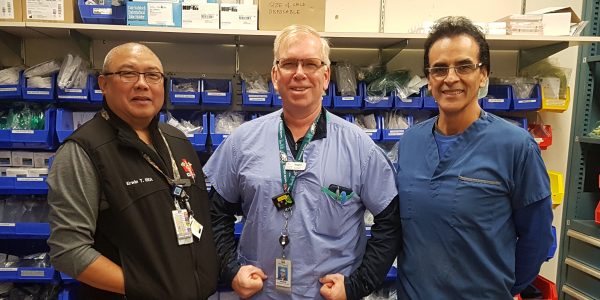Life underground: spotlight on Respiratory Therapy REAs
In the third in our series of profiles on the people working in the VGH campus tunnel, we meet the Respiratory Equipment Assistants (REAs) of our Respiratory Therapy Department and learn how this team contributes to quality patient care.
Respiratory Therapy: Respiratory Equipment Assistants (REAs)
Location: Respiratory Therapy has a location in the basement of JPP South where the REAs order, manage and repair some of the team’s equipment. However, REAs can be found all around the hospital installing, testing and fixing devices.
Staff: 5
Hours of operation: 5 days a week 07:00 to 23:00 and 07:00 to 15:00 on weekends
“Without them, I couldn’t do my job. They are integral members of the team. – respiratory therapist, Sydney Varey”
What is Respiratory Therapy and what does it do?
“Anyone who requires help breathing, we help keep them alive,” says Tony Alzua, REA.
This small but mighty team of REAs supports respiratory therapists (RTs) across the hospital. Working closely with the Medical Device Reprocessing Department and Biomedical Engineering, the team cleans, manages, maintains and delivers equipment and supplies for patients with lung and cardiac issues.
The REAs assist RTs with programming ventilators to ensure correct initial settings. Once a patient no longer needs the ventilator, the REAs sanitize and recircuit (change out the tubing) it so it’s ready for the next patient.
The team stocks much of the respiratory equipment in the ICU and constantly monitors supply levels. “They make sure we have the equipment before we know we need it,” says Sydney. “If we need something like a specialty scope, they’ll rush it up to the ward, which means I don’t have to leave the patient’s side.”
The REAs also order and manage medical gases and specialized equipment, and repair devices like flowmeters and ventilator arm pieces.
How do the REAs support the delivery of quality patient care?
REAs are critical to providing quality patient care. Every patient at VGH who requires oxygen (or other medical gases) or a ventilator relies on this team and the equipment they service.
“The patient is at the forefront of their work even though they’re not at the bedside,” says Andrea Wnuk, professional practice lead, Respiratory Therapy. “Something simple like making sure equipment is clean is huge for patient care.”
How do REAs support innovation in health care?
Innovation isn’t always about using the latest and greatest technology. Sometimes, it’s simply looking at a new way to solve a problem, which is a large component of what this team does.
“The team constantly looks at ways to streamline processes and reduce costs,” Sydney says. “Instead of purchasing something directly from the vendor, they’ll often source the individual pieces and put items (like ventilator circuits) together themselves, which is more cost-effective.”
What else do REAs do?
Every day the team checks to ensure that there are oxygen tanks on every floor of both hospital towers. “Some days I deliver 60 tanks,” says REA Erwin Torres.
One important function of these tanks is to allow patients some independence. “We provide portable oxygen tanks to patients so that they can get up and walk around. Otherwise, they would be bed-bound,” says REA Vaughn Eagles. “It’s important work. I enjoy the challenge, the camaraderie and making sure the department has what it needs for patient care.”
Fast fact:
- REAs deliver between 50 and 100 portable oxygen tanks to patients each day; each tank weighs approximately 10 lbs.
Who else works in the VGH Tunnel?
Read more in our series about the people who work in the VGH tunnel:
- Life underground: spotlight on Biomedical Engineering
- Life underground: spotlight on Medical Device Reprocessing Department


Jeff Liang
You all do an amazing job and always with a smile. Very approachable and an important part of the VGH team.
Corrie Irwin
Woooo Hoooo REA’s!!
Lois Budd
You all do an amazing job-most of it behind the scenes. It is great to see you highlighted-you do important work!
Vaughn Eagles
Three other REA’s that were not mentioned are William Orsua(F/T), Rey Masecampo (P/T), and retired (C) worker Michael Tressidder, all of whom have an equal roll in maintaining the smooth operation of the department.